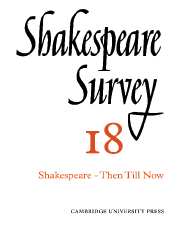Book contents
- Frontmatter
- Chiding the Plays: Then till Now
- ‘The Great Variety of Readers’
- Shakespeare’s Text—Then, Now and Tomorrow
- ‘Hamlet’ Then Till Now
- Shakespeare’s Imagery—Then and Now
- The Study and Practice of Shakespeare Production
- Shakespeare on the Screen
- Shakespeare in the Opera House
- Some Shakespearian Music, 1660–1900
- Shakespeare in America: A Survey to 1900
- International Notes
- Shakespeare Productions in the United Kingdom: 1962–4
- Three Kinds of Shakespeare: 1964 Productions at London, Stratford-upon-Avon and Edinburgh
- The Year's Contributions to Shakespearian Study 1 Critical Studies
- 2 Shakespeare’s Life, Times and Stage
- 3 Textual Studies
- Books Received
- Index
- Plate section
Shakespeare on the Screen
Published online by Cambridge University Press: 28 March 2007
- Frontmatter
- Chiding the Plays: Then till Now
- ‘The Great Variety of Readers’
- Shakespeare’s Text—Then, Now and Tomorrow
- ‘Hamlet’ Then Till Now
- Shakespeare’s Imagery—Then and Now
- The Study and Practice of Shakespeare Production
- Shakespeare on the Screen
- Shakespeare in the Opera House
- Some Shakespearian Music, 1660–1900
- Shakespeare in America: A Survey to 1900
- International Notes
- Shakespeare Productions in the United Kingdom: 1962–4
- Three Kinds of Shakespeare: 1964 Productions at London, Stratford-upon-Avon and Edinburgh
- The Year's Contributions to Shakespearian Study 1 Critical Studies
- 2 Shakespeare’s Life, Times and Stage
- 3 Textual Studies
- Books Received
- Index
- Plate section
Summary
Shakespeare’s plays were written to be used by live actors in the presence of a crowd. It follows that all screen versions of them are subject to the limitations of the screen. Neither the actors nor their audience can conform to the conditions which the author had in mind. Instead of the text there will be a script; instead of the actor in person, there will be his image in two dimensions. Any situation in which the substitute looks like gaining ground over the original would have a vital bearing on Shakespearian studies, but today the screen, the substitute, has not only gained ground on Shakespeare productions in the theatre. Apart from a minority, it has superseded them; and the scholars and critics who make it their business to assess the plays and Shakespeare’s intentions have scarcely begun to be aware of the fact. Yet around them is building up the pressure of a public, including scholars of the future, which draws its assumptions about Shakespeare from what happens on the screen.
This public far outnumbers anything heard of in the history of the theatre. For the B.B.C.'s An Age of Kings, the serial version of the history plays, the average viewing audience was three million; for its successor, the Roman plays titled The Spread of the Eagle, four million. These figures do not include audiences in the U.S.A. and elsewhere. If we bear in mind that the series were viewed in many places where there was little competition from the professional theatre, and in most places none at all, it means that the producer-director of these television versions, Peter Dews, is by a long way the most influential interpreter of Shakespeare in the English-speaking world.
- Type
- Chapter
- Information
- Shakespeare Survey , pp. 70 - 74Publisher: Cambridge University PressPrint publication year: 1965

